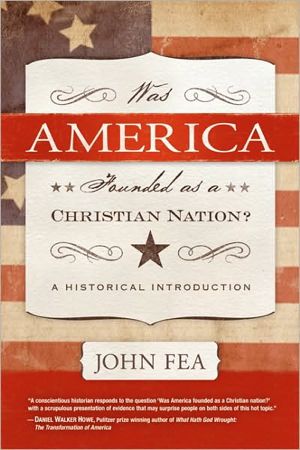 Now that we have experienced how to think historically, let’s apply some of those skills. As we mentioned earlier, a few of our posts will discuss a Newport Historical Society event held on June 21 entitled “How Christian an Understanding?” John Fea, author of Was America Founded as a Christian Nation?: A Historical Introduction, spoke first, encouraging the audience to ask appropriate historical questions. He then modeled this, discussing a few examples of the relationship between religion and politics in the past.
Now that we have experienced how to think historically, let’s apply some of those skills. As we mentioned earlier, a few of our posts will discuss a Newport Historical Society event held on June 21 entitled “How Christian an Understanding?” John Fea, author of Was America Founded as a Christian Nation?: A Historical Introduction, spoke first, encouraging the audience to ask appropriate historical questions. He then modeled this, discussing a few examples of the relationship between religion and politics in the past.
While historians try to be impartial and think historically about the past, all historians still have biases. In the interest of full disclosure, I will reveal my own partiality so that you can think critically about my analysis. John Fea was one of my undergraduate professors and I spent three years as his personal research assistant. In fact, I actually helped him with research for Was America Founded as a Christian Nation? While it is important to think critically about primary sources, historians also need to methodologically examine secondary sources written by other scholars. So, feel free to practice this skill and try to decide if I am doing a fair job of analyzing my own professor’s work!
Cracking a few jokes to open his portion of the program, John Fea listed a few questions which he has been asked about religion and history such as “What was George Washington’s view on abortion?” and “Would Thomas Jefferson have voted for Barack Obama?” While these may seem like silly questions, they remind us, in an extreme way, of the problems that we encounter when we do not think historically. Fea suggested that the discipline of history is limited and we must be careful about jumping from the eighteenth century (or any other time in the past) to the present. Abortion was not an issue in Washington’s time, and Jefferson never had an opportunity to vote for Obama, so we should not make leaps from their ideological commitments to our political controversies today.
In encouraging the audience to think historically about the past, Fea was referencing the Preface of his book, in which he admits that the titular question (Was America founded as a Christian nation?) is quite complicated. In order to answer it, we must first decide on the definitions of “founded,” “Christian,” and “nation.” Does “founding” refer to 1607 when Jamestown was settled, or 1620 when the Pilgrims arrived, or the American Revolution in the 1770s and 1780s? Would a “Christian” nation write Christian doctrine into its founding documents or only allow Christians to participate in government? Or does “Christian” refer to the beliefs of the founders or the people at large? Did America become a nation in 1776 with the signing of the Declaration of Independence, or 1789 with the ratification of the United States Constitution, or even later? Does “nation” refer to the national government, the state governments, or the people themselves? Just as when we used the 5 Cs of historical thinking to understand Mary Dyer’s execution, thinking historically about this topic provides us with a number of questions to answer!
In order to show the pitfalls of ahistorical thinking, Fea discussed the concept of the “separation of church and state” throughout history. He noted that in the decision for the 1947 Emerson v. Board of Education case, Justice Hugo Black stated that the wall between religion and the national government was “high and impregnable.” Black referenced a letter from Thomas Jefferson to the Danbury Baptist Association of Connecticut in 1802. Jefferson wrote:
Believing with you that religion is a matter which lies solely between Man & his God…I contemplate with sovereign reverence that act of the whole American people which declared that their legislature should “make no law respecting an establishment of religion, or prohibiting the free exercise thereof,” thus building a wall of separation between Church & State.
Jefferson was not the first person in North America to use the metaphor. That honor actually goes to Roger Williams, the founder of Rhode Island, who sought to establish “a hedge or wall of separation between the garden of the church and the wilderness of the world,” as he noted in a 1644 letter.
But, as the 5 Cs and John Fea remind us, the past is complex. Even though Williams, Jefferson, and Black argued for the separation of church and state, did that mean that religion did not affect public life? Fea, and some of the other panelists whom we will discuss in future posts, answered with a resounding “no.” They suggested that American culture was heavily influenced by the Christian faith. This is reflected in everything from the architecture of public buildings to White House Christmas celebrations to the presence of chaplains in the military.
If the culture of the United States was intertwined with Christianity, what did that mean about the government? Did it reflect this culture, or did it adhere strictly to the concept of the separation of church and state? And what about Roger Williams? How did his original argument for separating religion and politics influence the history of Rhode Island and the United States at large? We’ll consider some of these questions in our next blog post which will focus on John Barry, the second panelist and author of Roger Williams and the Creation of the American Soul: Church, State, and the Birth of Liberty.
